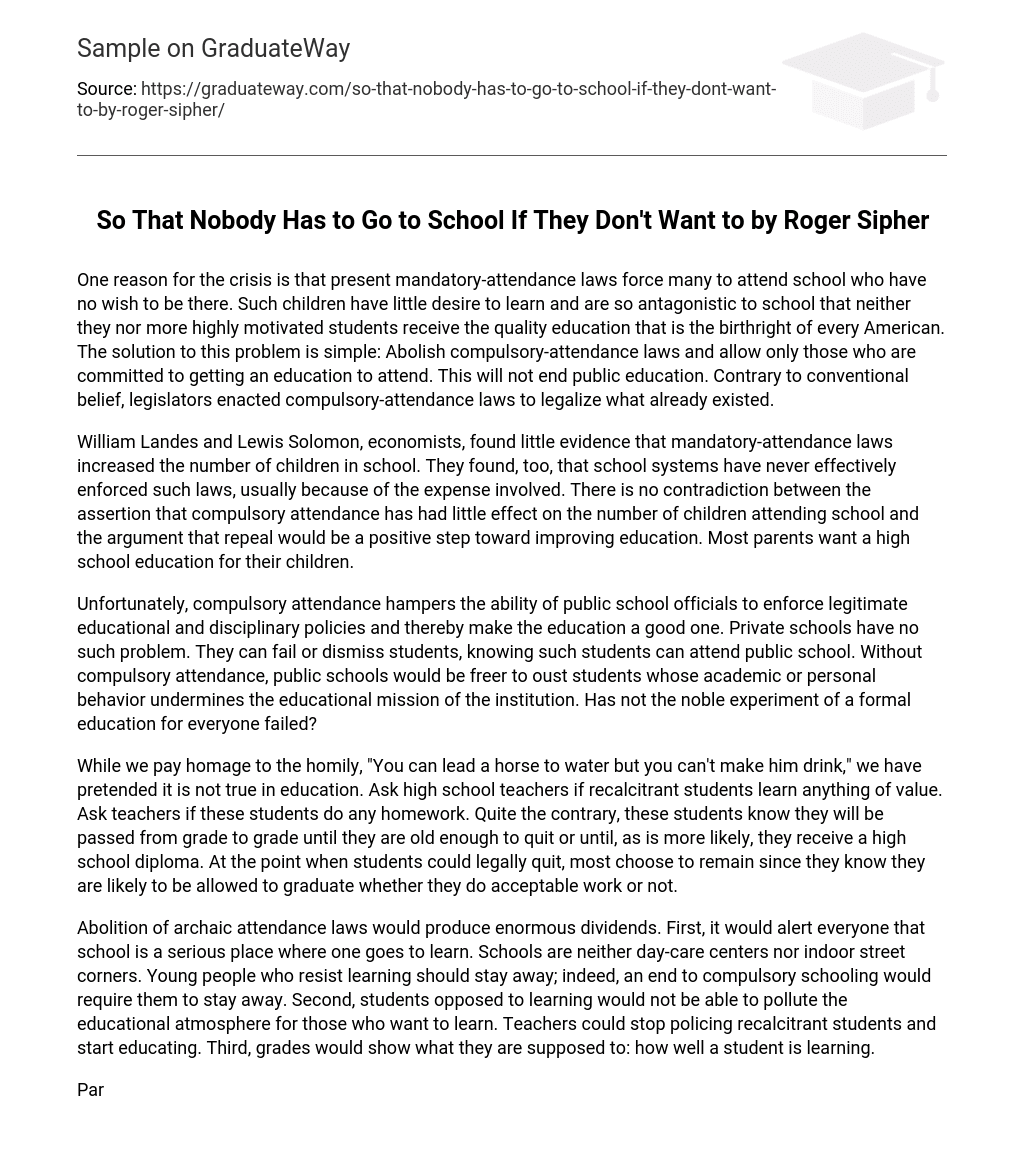The crisis arises from the existence of mandatory-attendance laws that compel individuals, whether willing or not, to attend school. This results in a subpar education for both unmotivated students and their more driven peers, as these individuals lack interest in learning and possess a negative perception of schooling. To tackle this issue, we should abolish compulsory-attendance laws and allow only those who are dedicated to obtaining an education to participate. It is important to recognize that eliminating these laws does not equate to eradicating public education, as they were merely officialized by legislators rather than introducing a novel concept, contrary to popular belief.
Economists William Landes and Lewis Solomon have discovered limited evidence to support the notion that mandatory-attendance laws have resulted in a rise in school enrollment. These laws are usually not enforced effectively by schools due to their expensive nature. Nevertheless, it is crucial to acknowledge that this lack of impact on attendance does not contradict the argument suggesting that abolishing these laws would be advantageous for enhancing education. Parents commonly aspire for their children to obtain a high school education.
The requirement for students to attend public schools hampers school officials from effectively enforcing educational and disciplinary policies, which in turn affects the quality of education. However, private schools are not constrained by this issue as they can expel or fail students, knowing that these students have the option to attend public schools. If compulsory attendance is removed, public schools would have the freedom to remove students who undermine the institution’s educational mission due to their academic or personal behavior. This raises the question of whether providing a formal education for all has been an unsuccessful noble experiment.
In education, we have ignored the age-old saying, “You can lead a horse to water but you can’t make him drink.” However, if we ask high school teachers if defiant students gain any valuable knowledge or if they complete their homework, we will find quite the opposite. These students are aware that they will progress through grades without meeting the necessary requirements until they are old enough to drop out or until, more commonly, they obtain a high school diploma. Despite reaching the legal age to quit, most students opt to stay, as they understand that they are likely to graduate regardless of their effort.
The elimination of outdated attendance laws would bring about substantial advantages. Firstly, it would act as a reminder that school is meant for education and not as a daycare or a socializing place. It would discourage those who are unwilling to learn from attending, thereby enforcing the removal of compulsory schooling. Additionally, students who resist learning would no longer have the chance to adversely affect the educational atmosphere for those who are enthusiastic about learning. Teachers could prioritize imparting knowledge instead of dealing with defiant students. Lastly, grades would genuinely reflect a student’s level of understanding as intended.
Parents would be able to read report cards once again and determine if their children were making progress. Public esteem for schools would also increase, as they would no longer be seen as mere intermediate stops for adolescents, but rather as institutions dedicated to educating America’s youth. Additionally, elementary schools would undergo significant transformations, as students would recognize the importance of learning early on in order to avoid failing in later years. Consequently, elementary teachers would no longer need to pass on their unsuccessful students to junior high and high school. Finally, the expense of enforcing compulsory education would be diminished.
Despite enforcement efforts, around 15 percent of school-age children residing in our major cities are consistently absent from school. These savings could be allocated by communities to support institutions that cater to young individuals who are not enrolled in school. Even if these institutions ultimately prove to be more expensive, it would be beneficial as it would prevent the confusion between their purpose and that of schools. The primary objective of schools should be education, but currently, they only fulfill this goal indirectly. They have attempted to fulfill a broad social role, attempting to meet the needs of all individuals. Unfortunately, in the process, they have failed significantly at accomplishing their original mission.





